高一英语人教版(2019)必修第一册Unit 2 Travelling around Discovering useful structutres课件 (15张PPT)
文档属性
| 名称 | 高一英语人教版(2019)必修第一册Unit 2 Travelling around Discovering useful structutres课件 (15张PPT) | 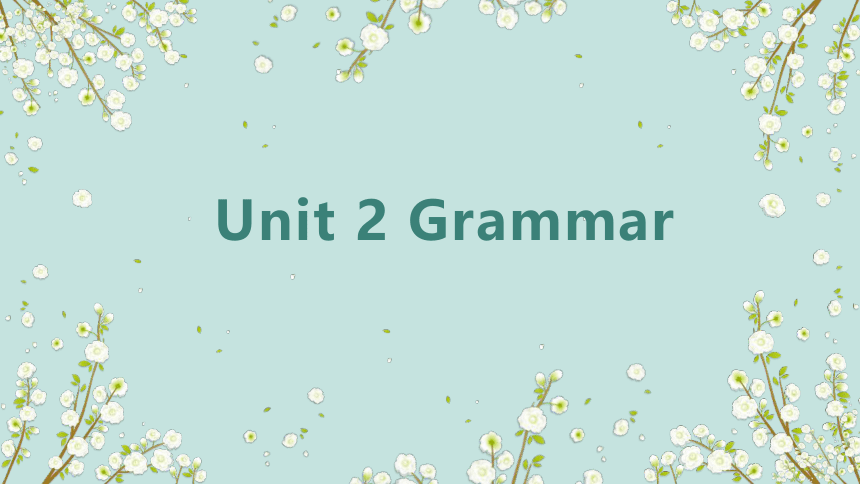 | |
| 格式 | pptx | ||
| 文件大小 | 1.0MB | ||
| 资源类型 | 教案 | ||
| 版本资源 | 人教版(2019) | ||
| 科目 | 英语 | ||
| 更新时间 | 2022-10-28 09:22:54 | ||
图片预览

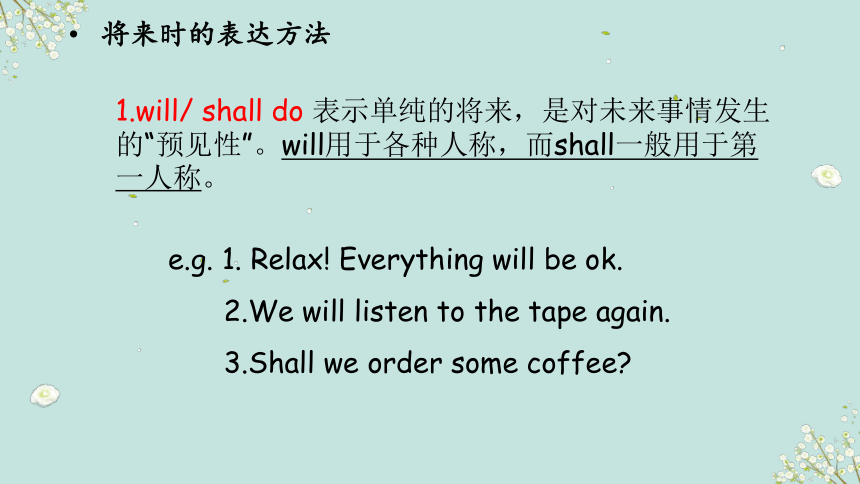
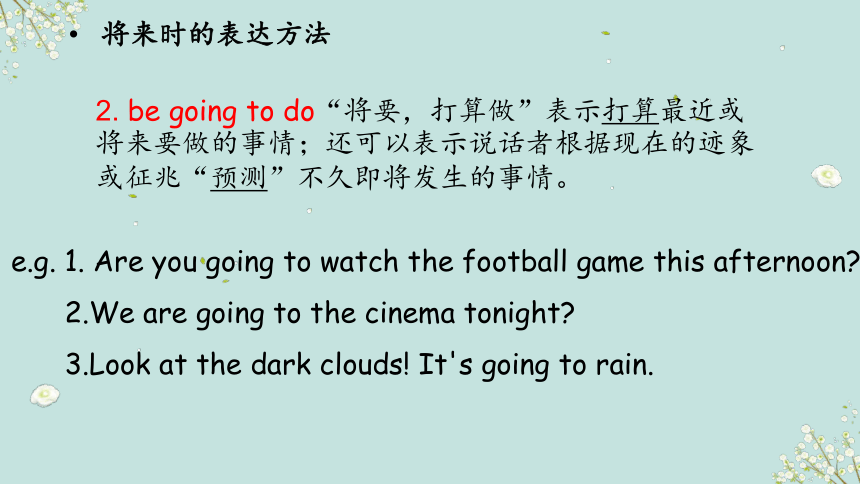

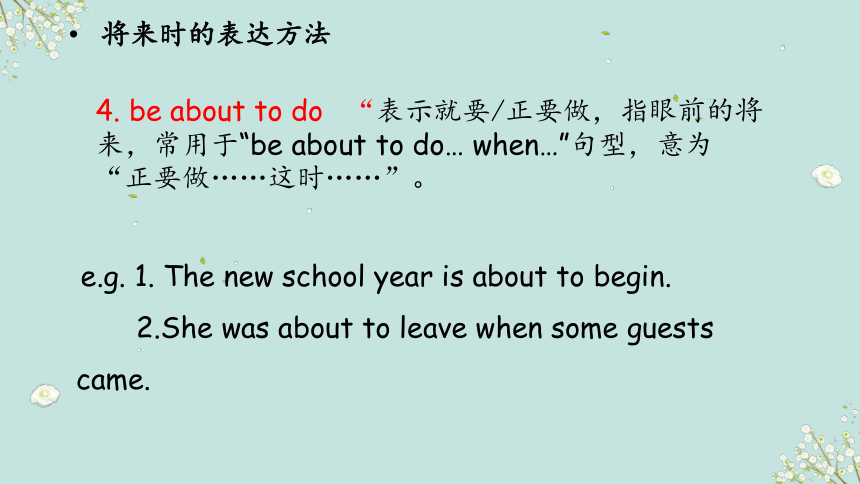
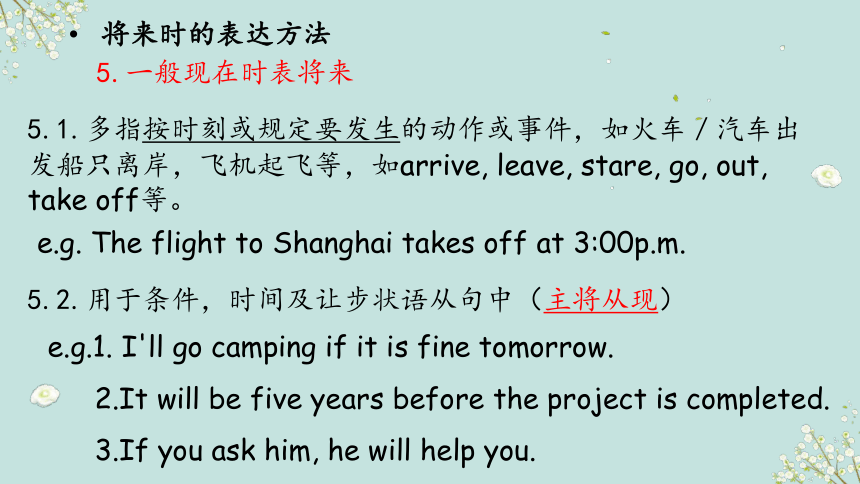

文档简介
(共15张PPT)
Unit 2 Grammar
将来时的表达方法
1.will/ shall do 表示单纯的将来,是对未来事情发生的“预见性”。will用于各种人称,而shall一般用于第一人称。
e.g. 1. Relax! Everything will be ok.
2.We will listen to the tape again.
3.Shall we order some coffee
将来时的表达方法
2. be going to do“将要,打算做”表示打算最近或将来要做的事情;还可以表示说话者根据现在的迹象或征兆“预测”不久即将发生的事情。
e.g. 1. Are you going to watch the football game this afternoon
2.We are going to the cinema tonight
3.Look at the dark clouds! It's going to rain.
将来时的表达方法
3. be to do “想做,打算做”表示预定,按计划或安排将会发生,也可表示将来必定发生或表示命令。
e.g. 1. She is to get married next month.
2.The Quee is to visit Japan next week.
将来时的表达方法
4. be about to do “表示就要/正要做,指眼前的将来,常用于“be about to do… when…”句型,意为“正要做……这时……”。
e.g. 1. The new school year is about to begin.
2.She was about to leave when some guests came.
将来时的表达方法
5.一般现在时表将来
e.g. The flight to Shanghai takes off at 3:00p.m.
5.1.多指按时刻或规定要发生的动作或事件,如火车/汽车出发船只离岸,飞机起飞等,如arrive, leave, stare, go, out, take off等。
5.2.用于条件,时间及让步状语从句中(主将从现)
e.g.1. I'll go camping if it is fine tomorrow.
2.It will be five years before the project is completed.
3.If you ask him, he will help you.
将来时的表达方法
6.现在进行时表将来
现在进行时表示将来主要用于表示接计划按排将要发生的动作或事件,这种用法给人种期待感,常表示最近式较近的将来
将来时的表达方法
6.1.用于位移动词
当句子涉及确切的计划、明确的意图或为将来安排好的活动时,常见的用现在进行时表将来动作的位移动词(短语)有:come, go, arrive, leave, get (to),start, return, fly, take, take off, see off, set off等。
e.g. 1. We're starting for Shanghai this afternoon.
2. Our flight is taking off and let's hurry up; or we will miss it.
现学现用
(1)Betty ____ __________ for Guangzhou by plane at 3:00 this afternoon.
贝蒂今天下午3点将乘飞机去广州。
(2)When ____ _____ __________ ____ for your holiday
你什么时候动身去度假?
(3)His plane ____ _________ ____ at 9:20, so he must be
at the airport by 8:30.
他乘坐的飞机将于9:20起飞,所以他必须在8:30之前到机 场。
is
leaving
are
you
setting
off
is
taking
off
将来时的表达方法
6.2.表示趋向性的动词
现在进行时表示将来除使用位移动词外,也可使用某些非位移动词,如do,get,have,meet,play,see,spend,start,stay,wear,work等,此时句中一般要有表示将来的时间状语。
e.g. 1. The young man is meeting his teacher this afternoon.
2. I am publishing a book this year.
现学现用
(1)What ________ ________ _________ next Sunday
下星期天你打算干什么?
(2)My mother ____ _________ me a bike soon.
我妈妈不久将给我买辆自行车。
are
you
doing
is
buying
现在进行时表将来与表进行的区别
1. 表将来时常用非延续性动词(瞬间动词)
e.g. The guest is arriving, but who will go to meet him at the airport.
2. 表进行时常用延续性动词
e.g. In the classroom, the students are discussing a plan.
现学现用
(1)Listen! She _____ _____ an English song
听!她正在唱英文歌。
(2)He ____ _________ back from Amwrica tomorrow.
他明天早上将从美国回来。
(3)I my friend to clean the classroom.
我正在帮助我的朋友打扫教室。
is
singing
is
coming
am
helping
thank you!
Unit 2 Grammar
将来时的表达方法
1.will/ shall do 表示单纯的将来,是对未来事情发生的“预见性”。will用于各种人称,而shall一般用于第一人称。
e.g. 1. Relax! Everything will be ok.
2.We will listen to the tape again.
3.Shall we order some coffee
将来时的表达方法
2. be going to do“将要,打算做”表示打算最近或将来要做的事情;还可以表示说话者根据现在的迹象或征兆“预测”不久即将发生的事情。
e.g. 1. Are you going to watch the football game this afternoon
2.We are going to the cinema tonight
3.Look at the dark clouds! It's going to rain.
将来时的表达方法
3. be to do “想做,打算做”表示预定,按计划或安排将会发生,也可表示将来必定发生或表示命令。
e.g. 1. She is to get married next month.
2.The Quee is to visit Japan next week.
将来时的表达方法
4. be about to do “表示就要/正要做,指眼前的将来,常用于“be about to do… when…”句型,意为“正要做……这时……”。
e.g. 1. The new school year is about to begin.
2.She was about to leave when some guests came.
将来时的表达方法
5.一般现在时表将来
e.g. The flight to Shanghai takes off at 3:00p.m.
5.1.多指按时刻或规定要发生的动作或事件,如火车/汽车出发船只离岸,飞机起飞等,如arrive, leave, stare, go, out, take off等。
5.2.用于条件,时间及让步状语从句中(主将从现)
e.g.1. I'll go camping if it is fine tomorrow.
2.It will be five years before the project is completed.
3.If you ask him, he will help you.
将来时的表达方法
6.现在进行时表将来
现在进行时表示将来主要用于表示接计划按排将要发生的动作或事件,这种用法给人种期待感,常表示最近式较近的将来
将来时的表达方法
6.1.用于位移动词
当句子涉及确切的计划、明确的意图或为将来安排好的活动时,常见的用现在进行时表将来动作的位移动词(短语)有:come, go, arrive, leave, get (to),start, return, fly, take, take off, see off, set off等。
e.g. 1. We're starting for Shanghai this afternoon.
2. Our flight is taking off and let's hurry up; or we will miss it.
现学现用
(1)Betty ____ __________ for Guangzhou by plane at 3:00 this afternoon.
贝蒂今天下午3点将乘飞机去广州。
(2)When ____ _____ __________ ____ for your holiday
你什么时候动身去度假?
(3)His plane ____ _________ ____ at 9:20, so he must be
at the airport by 8:30.
他乘坐的飞机将于9:20起飞,所以他必须在8:30之前到机 场。
is
leaving
are
you
setting
off
is
taking
off
将来时的表达方法
6.2.表示趋向性的动词
现在进行时表示将来除使用位移动词外,也可使用某些非位移动词,如do,get,have,meet,play,see,spend,start,stay,wear,work等,此时句中一般要有表示将来的时间状语。
e.g. 1. The young man is meeting his teacher this afternoon.
2. I am publishing a book this year.
现学现用
(1)What ________ ________ _________ next Sunday
下星期天你打算干什么?
(2)My mother ____ _________ me a bike soon.
我妈妈不久将给我买辆自行车。
are
you
doing
is
buying
现在进行时表将来与表进行的区别
1. 表将来时常用非延续性动词(瞬间动词)
e.g. The guest is arriving, but who will go to meet him at the airport.
2. 表进行时常用延续性动词
e.g. In the classroom, the students are discussing a plan.
现学现用
(1)Listen! She _____ _____ an English song
听!她正在唱英文歌。
(2)He ____ _________ back from Amwrica tomorrow.
他明天早上将从美国回来。
(3)I my friend to clean the classroom.
我正在帮助我的朋友打扫教室。
is
singing
is
coming
am
helping
thank you!
